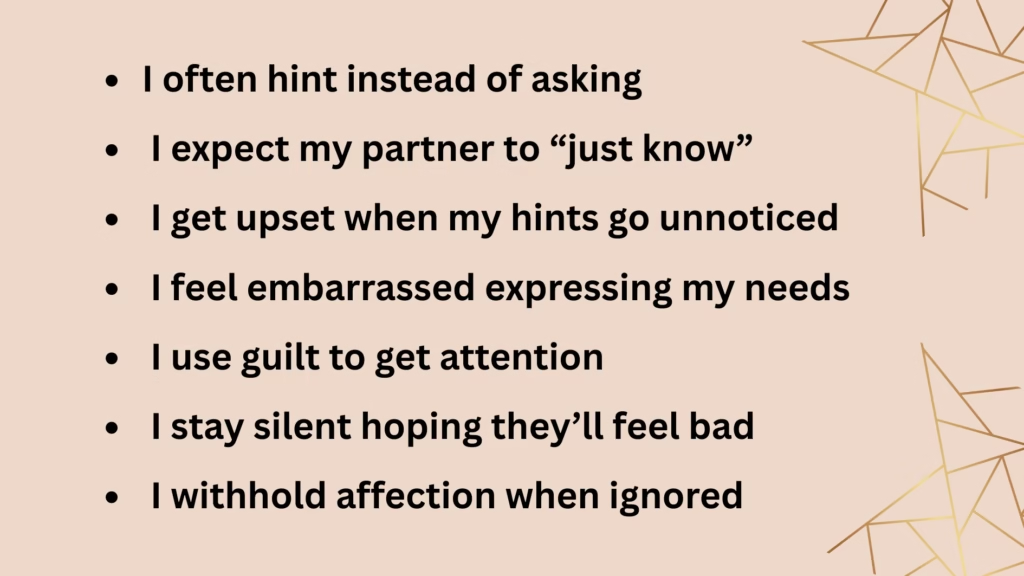Many relationships are being subtly harmed by the poisonous communication practice of dry begging, frequently without either partner recognizing it. Let’s say it aloud in the first sentence: Dry begging is sad, draining, and seriously detrimental to emotional closeness in addition to being manipulative.

A person who dry begs employs guilt, passive statements, or emotional manipulation to obtain what they want rather than expressing their wants explicitly. It might sound like:
-
“You always have time for your friends…”
-
“I guess I’ll figure it out myself…”
-
“If I mattered more, maybe you’d help…”
Sounds familiar? Let’s break it down.
🔍 What is Dry Begging?
It’s not about asking—it’s about not asking
Making a request is not the goal of dry begging. It involves expecting your spouse to read your mind and punishing them with guilt, sarcasm, or silence when they don’t.
Real-life example:
Samantha, 31, from Toronto, says:
“I used to hint that I wanted help with the kids by sighing loudly or saying, ‘I’m drowning here.’ But I never actually asked. I thought he should just know. Turns out, he didn’t—and we both ended up frustrated.”
🧠 Why Do People Dry Beg?
Rooted in fear, not intention
People dry beg because:
-
They fear rejection or looking “needy”
-
They’ve been taught not to express needs
-
They hope their partner will automatically understand
According to Dr. Hope Kelaher, licensed therapist and author of Here to Make Friends, dry begging is more about emotional survival than selfishness. “People fear being a burden,” she explains.
🧠 Recent Research Insights
A 2024 study by the American Psychological Association found that 56% of individuals in long-term relationships admitted to using guilt instead of clear requests. Couples who communicated passively reported:
-
Lower relationship satisfaction
-
Higher emotional exhaustion
-
Increased arguments over minor issues
(Source: APA Relationship Communication Survey 2024)
🔄 Comparison Table: Clear Communication vs Dry Begging
| Feature | Clear Communication | Dry Begging |
|---|---|---|
| Approach | Direct and respectful | Indirect and manipulative |
| Emotion conveyed | Vulnerability and openness | Guilt, sarcasm, frustration |
| Partner’s reaction | Understanding and action | Confusion, resentment |
| Long-term impact | Builds trust and connection | Damages intimacy and emotional safety |
💬 Case Study: When Hints Turn Harmful
Couple: James (34) and Priya (32)
Location: London, UK
Problem: James constantly hinted about Priya spending more time with her friends.
Instead of saying, “I miss spending time with you,” he’d say, “Out again tonight, huh?” Priya felt attacked. James felt ignored. Only during therapy did they learn he was dry begging for connection.
Result: With coaching, James practiced direct communication. “Can we plan a date night this week?” changed everything.
✅ Checklist: Am I Dry Begging?
Check any that apply:

If you checked 3 or more—it’s time for a communication reset.
💡 How to Break the Cycle of Dry Begging
1. Acknowledge What You Really Need
Self-awareness is your first step. Are you asking for:
-
Attention?
-
Help?
-
Validation?
-
Respect?
Name it. Don’t shame it.
2. Replace Hints With Honest Requests
Dry begging: “I guess I’ll just do everything myself.”
Clear request: “I’m overwhelmed. Can you help me clean the kitchen tonight?”
It feels scary—but it builds trust.
3. Learn to Receive ‘No’ Gracefully
Fear of rejection drives dry begging. Understand this:
A healthy “no” is better than a resentful “yes.”
It’s okay if your partner can’t help every time. What matters is your ability to speak your truth and be heard.
4. Rewire the Guilt Script

Guilt is not love. It’s control.
Instead of: “If you loved me, you’d do this,”
Try: “It would mean a lot to me if you could…”
5. Therapy Can Help, Not Hurt
Dr. Darren Magee, clinical psychologist, says:
“Patterns like dry begging often stem from childhood emotional neglect or poor modeling. Therapy helps you unpack, not blame.”
Explore relational therapy, especially Imago Therapy or EFT (Emotionally Focused Therapy).
🌎 Worldwide Relevance: Examples Across Cultures
-
USA: “I guess it’s fine, you always choose the restaurant.” (Dry begging for inclusion)
-
India: “You didn’t even notice what I wore today…” (Dry begging for validation)
-
UK: “Must be nice to have a job that lets you clock out at 5.” (Dry begging for empathy)
Different words. Same emotional hunger.
❓ FAQ’s : Dry Begging
Q1.What is dry begging in a relationship?
It’s when someone indirectly seeks support through guilt or passive-aggressive remarks instead of openly expressing their needs.
Q2.Is dry begging emotional abuse?
While not always abusive, chronic dry begging can lead to emotional manipulation and damage trust in a relationship.
Q3.How can I stop dry begging?
By recognizing your emotional needs, communicating them clearly, and embracing vulnerability over guilt.
Q4.Why do people dry beg instead of asking?
Often due to fear of rejection, shame, or being conditioned to believe their needs don’t matter.
Q5.Can dry begging be unintentional?
Yes. Most people don’t realize they’re doing it. That’s why awareness and reflection are key.
Q6.How can I respond if my partner dry begs?
Gently ask: “What do you really need from me right now?” Encourage directness without shame.
Q7.What therapy helps with communication habits like this?
Imago Therapy, EFT, and CBT (Cognitive Behavioral Therapy) are excellent starting points.
Q8.Is dry begging a form of gaslighting?
Not exactly, but it can feel emotionally manipulative. Unlike gaslighting, it’s rooted more in insecurity than control.
Q9.Are there books on this topic?
Yes. Try “Nonviolent Communication” by Marshall Rosenberg and “Set Boundaries, Find Peace” by Nedra Glover Tawwab.
Q10.Can dry begging ruin a good relationship?
Absolutely—if left unaddressed. It builds resentment and chips away at emotional closeness.
🧭 Final Thoughts
Dry begging is a silent killer of emotional intimacy.
A sigh or snarky comment might develop into a cycle of underlying animosity and unfulfilled desires.
However, you are not required to remain in that loop.
Clarity is therapeutic. Vulnerability is linked. Furthermore, even the darkest corners of miscommunication are illuminated by open, sincere conversation.
❤️ Special Advice for You
Don’t panic if you see yourself in this article. You’re not damaged. You are a human.
Begin modestly. Talk about one need right now. even if you have trembling voice. even if your heart is pounding.
Every unambiguous phrase is an act of dignity. Every sincere request is a step closer to love.
📣 Call to Action
✨ Tired of hinting your way into heartbreak?
Subscribe to our blog for powerful, real-world relationship advice rooted in psychology and heart.
💌 Leave a comment: Have you experienced dry begging—either from yourself or a partner? Share your story anonymously. Someone else might need to hear it.
Useful Articles :-
- Signs of Love Bombing: 7 Red Flags to Spot Manipulative Affection Early
- What Is a Situationship? 7 Unfiltered Truths About Modern Love
- 10 Signs of a Healthy Relationship: What To Look For
- Communication Skills for Couples: 7 Transformative Tips to Strengthen Your Connection
- 7 Powerful Ways to Build Healthy Relationship Boundaries for Lasting Love
- 9 Empowering Steps for Recovering from a Breakup: Heal, Grow, and Thrive
- 7 Powerful Long-Distance Relationship Advice : Tips to Keep the Spark Alive
- Jealousy in Relationships: 7 Powerful Ways to Manage the Green-Eyed Monster
- 5 Insights Into Love Languages in Relationships : Do They Really Work?
- What Does Emotional Safety In Relationships? 7 Biblical Keys to Building Trust and Intimacy